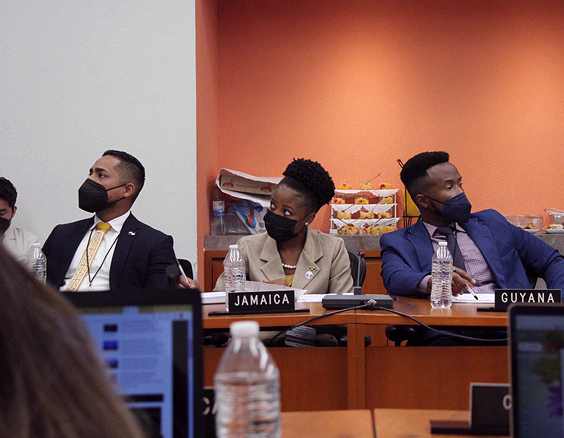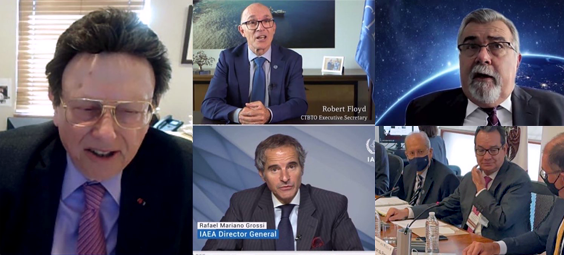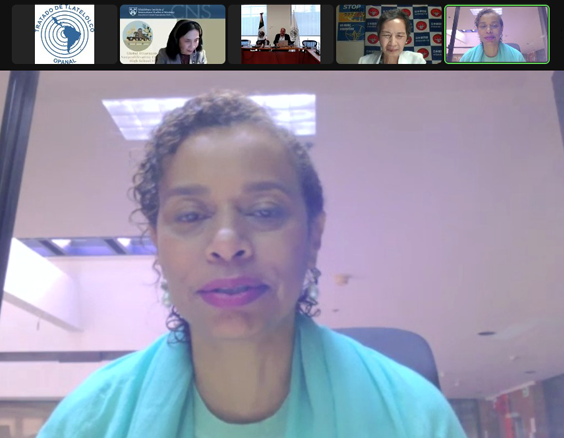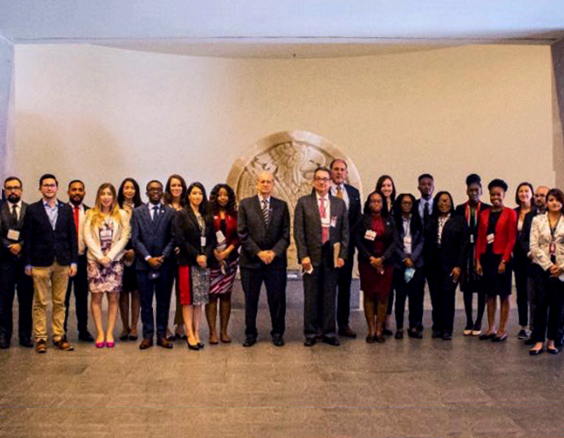July 25, 2022
Jean du Preez
The 8th Nuclear Disarmament and Nonproliferation Summer School for Latin America and Caribbean diplomats: A new generation of Latin American and Caribbean diplomats trained in the spirit of the legacy of Nobel Peace laureate García Robles
The 8th Nuclear Disarmament and Nonproliferation Summer School for Latin America and Caribbean diplomats was held in Mexico City from 11 – 15 July 2022. As in past years, the James Martin Center for Nonproliferation Studies (CNS) partnered with the Mexican Foreign Ministry, the Agency for the Prohibition of Nuclear Weapons in Latin America and the Caribbean (OPANAL), and the Matheas Romero Institute in Mexico to offer the course. After two online courses (due to COVID-19) in 2020 and 2021, the course was held in-person under strict health and safety protocols, bringing together 23 course participants from 22 countries in the region, including 8 from Caribbean Island States. Of further significance was that group of participants included a high rate of women participation (close to 70%). While a few course participants already had some experience in disarmament and nonproliferation, most were relatively junior in their respective foreign ministries, making their participation in the course even more important.

Training the Present and Future of Nonproliferation Diplomats
In his opening welcoming remarks, Dr. Eduardo Jaramilo Navarette, the Director General for the United Nations Department in the Mexican Foreign Ministry emphasized the importance of the course for a new generation of disarmament diplomats:
“New generations must become aware that, more than instruments of security, nuclear weapons are one of the most serious threats to the very existence of humanity. Latin America and the Caribbean have played a key and pioneering role in nuclear disarmament, with the establishment of the first nuclear-weapon-free zone in a densely populated area. Now, we need more Latin American experts in nuclear disarmament and non-proliferation, diplomats who will continue to echo the spirit of the Treaty of Tlatelolco and fight for the elimination of nuclear weapons. We need you. You are the present and the future of nuclear disarmament.”
IAEA Director-General Rafael Grossi, CTBT Executive Secretary Robert Floyd, and Mr. Thomas Markram (Director for the UN Department for Disarmament Affairs on behalf of the UN High Representative for Disarmament) emphasized in messages to the course participants the importance of the region in global nuclear nonproliferation and disarmament, and the role of countries from the region in support of the IAEA, the CTBTO, and the United Nations. Like Dr. Jaramilo, they emphasized the key role of the next generation of experts and the role of training opportunities such as the Summer School.

The course curricula included a wide spectrum of nonproliferation, arms control, and disarmament topics. Lectures and panel discussion included technical topics such as nuclear fission and fusion, basic nuclear weapon technologies and the nuclear fuel cycle, as well as more policy orientated sessions on the NPT, CTBT, TPNW, the continuous importance of the Tlatelolco and other NWFZ treaties, the role of the IAEA and safeguards, and the importance of nuclear security.
Impacts of War
Course participants had a unique opportunity to hear a first-hand testimony from a Hibakusha, Ms. Masako Wada, a survivor of the atomic bombing of Nagasaki. Her testimony not only placed the course in context, but her emotional plea to a younger generation of diplomats to never forget the horrors inflicted by the use of atomic weapons, served to inspire course participants and lecturers alike.
Given the Russian invasion of Ukraine, the impact of the war on the broader arms control and disarmament agenda was addressed in a number of sessions, including in the keynote lecture by CNS Founding Director, Prof William Potter on “Current Proliferation Challenges and Non-Proliferation Opportunities.” Impacts of the war were also discussed during a session entitled “Status and Prospect of US-Russian Dialogue on Arms Control” that featured Senior Fellow and former Soviet/Russian arms control negotiator, Dr. Nikolai Sokov of the Vienna Center for Disarmament and Nonproliferation (VCDNP) and senior US State Department official Mr. Thomas Countryman.
Peaceful Uses of Nuclear Energy
For the first time, the course included a session on the peaceful uses of nuclear energy with particular emphasis on role of nuclear sciences and technologies in developing countries, as well as a session on the nexus between nuclear terrorism, nuclear security, and the peaceful uses of nuclear energy. A particular highlight of the course was a field trip to the Mexican National Institute for Nuclear Research (ININ) outside Mexico City, where course participants observed the operation of the TRIGA Mark III nuclear research reactor first-hand and received a tour and briefings on other nuclear energy and science related research projects at the Institute.
Expert Voices
Course lecturers, panelists, and moderators included a number of experts from CNS/VCDNP, the Mexican Foreign Ministry, and OPANAL as well as other notable experts from Mexico such as Dr. Alejandro Núñez Carrera (General Director, Mexican National Commission for Nuclear Safety and Safeguards); Mr. Gustavo Molina (Coordinator for Radiological Safety, National Institute for Nuclear Research); and Ms. Maria Antonieta Jáquez Huacuja (Political coordinator and disarmament expert from the Permanent Mission of Mexico to the United Nations in New York). Other regional expert speakers included Amb. Elayne Whyte (2022 Harvard Leadership Fellow and former Costa Rican Ambassador and Permanent Representative to the United Nations in Geneva); Mr. Claudio Leopoldino (Division Head for Disarmament and Sensitive Technologies from the Brazilian Ministry of External Relations); and Ms. Irma Arguello, (Chair of NPSGlobal Foundation in Argentina).

The IAEA and the CTBTO were represented by Mr. Ionut Suseanu (IAEA Department of Safeguards), Dr. Luis Longoria Gándara (Director for Latin America and the Caribbean Division in the IAEA’s Technical Cooperation Department), and Dr. Martin Kalinowski (CTBTO’s International Data Center Division). Mr. Jonathan Brewer (Chair of the UN Security Council Committee Group of Experts on Resolution 1540) gave an important talk on the implantation of UNSC 1540.
Two former CNS Visiting Fellows, Ms. Martha Mariana Mendoza (OPANAL International Relations Officer) and Ms. Paola Ramirez Valenzuela (currently serving as First Secretary at the Permanent Mission of Mexico to the International Organizations in Rome), contributed and participated as lecturers. In addition, Ms. Grecia Sedano, MIIS nonproliferation and terrorism studies master’s candidate and current CNS intern at OPANAL, assisted OPANAL in co-hosting the course and benefitted from the weeklong program.
Participant Reviews
The course was by all accounts a major success. As one participant observed, “The program was a once-in-a-lifetime-opportunity to learn about the most respected voices of the field, so to then be able to perfect my knowledge on this realm, share the acquired knowledge with colleagues, and be prepared to work in a multilateral mission.” Another participant commented, “My participation in this program was my first deep approach in nonproliferation and nuclear disarmament topics. With this knowledge I will be able to work more prepared than before in my office and I will be able to have a better understanding of the problems and the concerns that the disarmament world is living.” Emphasizing the legacy of the region in disarmament, a third participant felt “proud of the commitments and cooperation that this peaceful region demonstrates, in order to keep working on nuclear peaceful uses, disarmament, and nonproliferation. This course is an outstanding example of what we can achieve due to our historical cooperation on this field.”
Echoing this sentiment, the Director General for the United Nations Department in the Mexican Foreign Ministry, Dr. Jaramilo in his closing remarks recalled the “illustrious Mexican Ambassador Alfonso García Robles, father of the Treaty of Tlatelolco, who warned 40 years ago, upon receiving the Nobel Peace Prize: ‘Humanity is faced with a dilemma: we must stop the arms race and proceed to disarmament or face annihilation.’” Dr. Jaramillo emphasized that “this statement remains valid today, in the face of increasing tensions, armed conflicts, and the loss of trust among key global players; in the face of the widening gap between the budget allocated to armaments that invest in social development, at a time when there are still great needs in the area of health. Seeing you gathered here in this room, observing your great interest in this issue, I am convinced that the principles of the Treaty of Tlatelolco, the legacy of Ambassador García Robles, will remain alive thanks to you, thanks to the new generations of Latin American diplomats who will take over.”
About the Program
CNS wishes to express it gratitude to the co-organizers of the 8th Summer School and to the Carnegie Corporation of New York and the MacArthur Foundation for their support in ensuring the success of another the Summer School. The 9th Summer School will be held in Mexico City in July 2023.
For more information on the Summer School and other CNS education and training activities, contact Mr. Jean du Preez.

